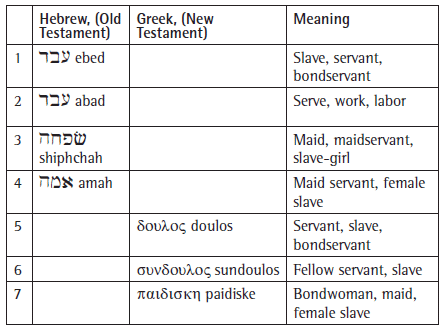InChrist
Free4ever
And really what difference would that make? People choose to violate God's commands when it suits them no matter how clearly they are laid out in the scriptures.That's a step in the right direction.
Your link used the word manstealers in its translation. If I were condemning literal slavery, I would use a phrase like slave owner or slave master.
This is a typical example of scriptural vagueness. I'm wondering what we are discussing here, and what law these enslavers would be breaking. The Bible is clear about slavery being an acceptable practice and only condemns it in specific circumstances, meaning that it is not slavery per se that is forbidden, but certain practices such as beating a slave to death if he dies too quickly. It's not a violation of biblical law if a lethal beating results in a prolonged death.
The word translated as menstealers is the Greek ἀνδραποδισταῖς pronounced andrapodistais, and translated as kidnappers or menstealers in most translations of the Bible, although two agree with you and use the words slave traders (World English Bible) and slave dealers (Weymouth New Testament).
But let's call that scripture a condemnation of slavery, or at least one that could be read that way as at least two teams of translators did.
It's too weak to be meaningful. Anybody that wanted to own slaves could simply say that enslavers refers to kidnapping, or stealing a person, not buying a person, which it could be argued is the legal way to acquire a slave.
Or one could simply claim as so many do when confronted with inconvenient scriptures that the words are merely metaphor. Perhaps menstealers refers to women who steal men from their wives, or people who lead others to perdition. Greek has a word for slave: Strong's Greek: 1401. δοῦλος (doulos) -- a slave. One might ask why the scripture doesn't include the word for slave if it were was about slavery, and why there are so many scriptures instructing slave owners on the proper way to own a person.
What is lacking is a clear, simple, and unambiguous statement such as "Thous shalt have no slaves. Owning people is an abomination unto God."
The fact is that God has allowed humans a lot of freedom on this earth to do things which He does not condone because He is not micro-managing every detail, but instead giving room for individuals to seek His will and wisdom. The scriptures give enough instruction and information that anyone seeking to know and live within God's love would realize that owning another person as if they are property, treating them as less than human or mistreating others is outside the will of God.
Greek and Hebrew Words for “Slave”
The Hebrew and Greek words used for “slave” are also the same words used for “servant” and “bondservant,” as shown by the following table.

"It is important to note that neither slavery in New Testament times nor slavery under the Mosaic Covenant have anything to do with the sort of slavery where “black” people were bought and sold as property by “white” people in the well-known slave trade of the last few centuries. No “white” Christian should think that he or she could use any slightly positive comment about slavery in this chapter to justify the historic slave trade, which is still a major stain on the histories of both the United States and the UK."
"As we already know, harsh slavery was common in the Middle East as far back as ancient Egypt. If God had simply ignored it, then there would have been no rules for the treatment of slaves/bondservants, and people could have treated them harshly with no rights. But the God-given rights and rules for their protection showed that God cared for them as well.
This is often misconstrued as an endorsement of harsh slavery, which it is not. God listed slave traders among the worst of sinners in 1 Timothy 1:10 (“kidnappers/men stealers/slave traders”). This is no new teaching, as Moses was not fond of forced slavery either:
He who kidnaps a man and sells him, or if he is found in his hand, shall surely be put to death.
(Exodus 21:16)"
Doesn’t the Bible Support Slavery?
